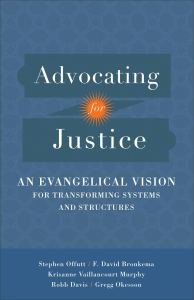God as advocate
God as advocate
Our MCC Ottawa Office has been engaged in advocacy since it was founded in 1975, but we still occasionally are asked why we are involved in speaking to government as a church-based relief, development and peacebuilding agency. After all, the question often goes, doesn’t scripture admonish us to simply feed the hungry, clothe the naked or give water to those who thirst?
We as staff have developed a response to this question. We have many reasons for justifying the work we are mandated to do, not the least of which is the role that advocacy plays in the Bible. We point out how biblical characters like Moses, Esther, Daniel and John the Baptist spoke to the powers of their time, sometimes with a divine call to do so. We lift up the words of prophets like Amos and Isaiah who denounced the evil practices of kings. We point to Jesus and how he challenged the religious authorities of his day.
 A new book gives us a deeper way of responding to the skeptics who believe that advocacy is beyond the realm of a Christian humanitarian agency.
A new book gives us a deeper way of responding to the skeptics who believe that advocacy is beyond the realm of a Christian humanitarian agency.
The book is Advocating for Justice: An Evangelical Vision for Transforming Systems and Structures, written by Stephen Offutt and four other U.S. church leaders (one of them, Robb Davis, was executive director of Mennonite Central Committee for a short period of time). The book speaks to evangelicals suspicious of advocacy and seeks to persuade them that advocacy is as important as any other form of Christian ministry, whether evangelism, relief, service or development.
The book accepts – as would our Ottawa Office – that reasons to engage in advocacy include: 1) the fact that partners call for it, 2) that it can address root causes of suffering, and 3) that it can have a much more sweeping and lasting impact than, say, relief distribution. But the authors’ key argument is a theological one – namely, we are advocates because God is an advocate.
God advocates by speaking creation into being and regularly calling that creation to care for the poor and weak, the widows and orphans. God advocates through the “vivid brilliance” of Jesus, whose proclamation of the “kingdom” (a political term indeed!), and whose healing, teaching and sacrificing ministry reconciles the world to Godself. God advocates through the Holy Spirit who is present with the believers and who empowers them to “bear witness to the life of Jesus applied to all facets of society, whether education, economics, or even politics” (70). Advocate is a metaphor for God’s very triune nature.

L-R: Ted and Katherine Oswald (MCC Reps in Haiti), Member of Parliament Bev Shipley, Clare Maier (former Ottawa Office intern), Rebekah Sears (MCC Ottawa Office policy analyst).
Not only that! The authors argue that for Christians, as “image-bearers” of Christ, advocating to “the powers” is an essential part of being faithful disciples. They also caution that any all such advocacy must reflect the basic Christian principles of humility, integrity and love for the other.
There is much more to commend this book. For example, it identifies the important roles of local congregation, denomination, church-based NGOs and para-church organizations in advocacy. It also analyzes key Christian advocacy initiatives and their strengths and weaknesses. More importantly, it identifies and challenges that which makes many evangelicals skeptical of advocacy: a highly individualistic view of the gospel.
What I found particularly interesting was the chapter that addresses challenges and tensions in faith-based advocacy. Many of the issues addressed are ones that our office is confronted with regularly, such as, for example, the tension between integrating a faithful response to the advocacy request of our partners with the approval of our donors and supporters. Or, to get more specific, how do we call for bold action on climate change (because that is our partners’ plea), when some of our donors resist the notion that climate change is human-induced?
For Christians who already embrace the notion of faith-based advocacy, the book will not be necessary. But for evangelicals and others who are still wary of the place of advocacy in the life of faith, it is a major contribution.
And for us in MCC’s Ottawa Office, it gives us new language to communicate why we do what we do. We advocate because God advocates.
By Esther Epp-Tiessen, Public Engagement Coordinator for the Ottawa Office. First published at their blog: MCC Ottawa Office Notebook



